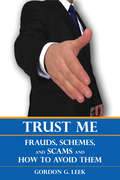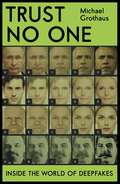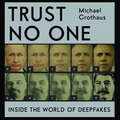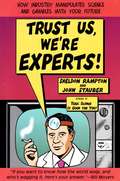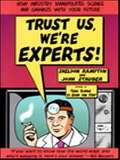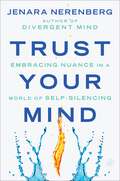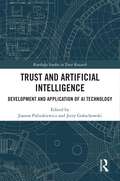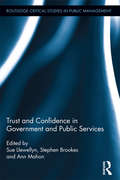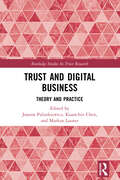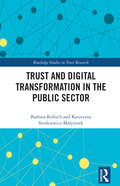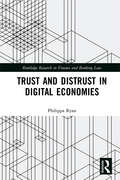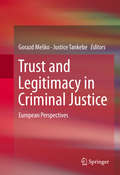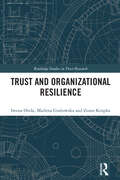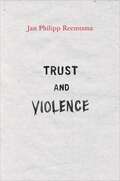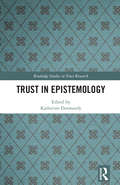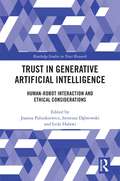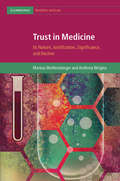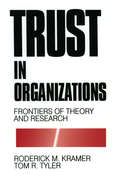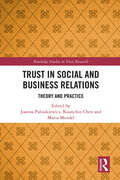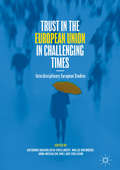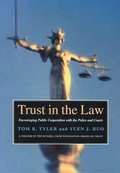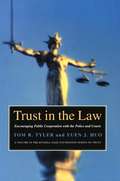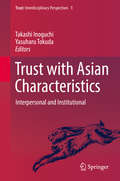- Table View
- List View
Trust Law in Asian Civil Law Jurisdictions
by Rebecca Lee Lusina HoThe reception of the trust in civil law jurisdictions has generated considerable conceptual debate internationally and in East Asia. In Trust Law in Asian Civil Law Jurisdictions, the authors: - provide a detailed comparative examination of trusts laws in Asian civil law jurisdictions from both operational and theoretical perspectives; - discuss the reception of the trust laws in Japan, South Korea, Taiwan and China and the challenges facing them; - engage in in-depth comparative inquiries as to how these Asian legal systems resolve questions pertaining to the trust; and - evaluate the distinctive features of Asian trusts and how they are moulded to suit the civilian legal frameworks within which they are situated. The analysis intersects with the Trento trust project in Europe, but also differs from it by providing valuable perspectives of the 'Asian' approaches to trusts researchers in Asia and the Anglophone world at large.
Trust Me: Frauds, Schemes, and Scams and How to Avoid Them
by Gordon G. LeekCon men, swindlers, snake-oil salesmen, carpetbaggers, and plain everyday liars and cheats - these names and the scoundrels behind them have been around for hundreds of years, though their dodges and deceptions have been refined with the passage of time. The worldwide growth of criminal fraud has mushroomed to such a degree that traditional law-enforcement techniques have been unable to cope effectively with the fallout. Criminal fraud is a billion-dollar industry and has become a staple of organized crime rivalling drugs and prostitution as major sources of income. In North America the courts and governments fail to treat these crimes with the seriousness they deserve, often placing the blame on victims, or at the very least making them culpable. Former Calgary police detective and fraud expert Gordon Leek illustrates how a variety of frauds work and how to protect yourself from them, including simple cheque scams, elaborate telemarketing schemes, Internet swindles, and identity theft.
Trust No One: Inside the World of Deepfakes
by Michael GrothausDeepfake technology can create video evidence of just about anything: Hollywood superstar Margot Robbie in an orgyChinese president Xi Jinping declaring nuclear warbasketball legend Michael Jordan winning the World Cup. The only limit is the imagination. In a time where fake news and disinformation is becoming harder and harder to identify, it is more essential than ever to understand the dark origins of deepfakes. Journalist Michael Grothaus goes down the rabbit hole as he interviews the often morally dubious, yet incredibly skilled creators of this content. It's a journey that opens a window into the communities transforming reality. Challenging, enlightening and terrifying, Trust No One asks the question other people are too scared to: what happens when you can no longer believe your own eyes?'Michael Grothaus takes a hard look at the growth of deep fakes, examining cases that demonstrate the threats presented by morally dubious creators. From the personal to political, the impact of deep fakes is considered carefully by Grothaus, both on the victims and on society as a whole, creating an essential picture of a growing trend in disinformation.' Eliot Higgins, founder of Bellingcat
Trust No One: Inside the World of Deepfakes
by Michael GrothausDeepfake technology can create video evidence of just about anything: Hollywood superstar Margot Robbie in an orgyChinese president Xi Jinping declaring nuclear warbasketball legend Michael Jordan winning the World Cup. The only limit is the imagination. In a time where fake news and disinformation is becoming harder and harder to identify, it is more essential than ever to understand the dark origins of deepfakes. Journalist Michael Grothaus goes down the rabbit hole as he interviews the often morally dubious, yet incredibly skilled creators of this content. It's a journey that opens a window into the communities transforming reality. Challenging, enlightening and terrifying, Trust No One asks the question other people are too scared to: what happens when you can no longer believe your own eyes?'An alarming look at deepfakes' The Sunday Times'Michael Grothaus takes a hard look at the growth of deep fakes, examining cases that demonstrate the threats presented by morally dubious creators. From the personal to political, the impact of deep fakes is considered carefully by Grothaus, both on the victims and on society as a whole, creating an essential picture of a growing trend in disinformation.' Eliot Higgins, founder of Bellingcat
Trust No One: Inside the World of Deepfakes
by Michael GrothausDeepfake technology can create video evidence of just about anything: Hollywood superstar Margot Robbie in an orgy; Chinese president Xi Jinping declaring nuclear war; basketball legend Michael Jordan winning the World Cup. The only limit is the imagination. In a time where fake news and disinformation is becoming harder and harder to identify, it is more essential than ever to understand the dark origins of deepfakes. Journalist Michael Grothaus goes down the rabbit hole as he interviews the often morally dubious, yet incredibly skilled creators of this content. It's a journey that opens a window into the communities transforming reality. Challenging, enlightening and terrifying, this audiobook asks the question other people are too scared to: what happens when you can no longer believe your own eyes?(P) 2021 Hodder & Stoughton Limited
Trust Us, We're Experts
by Sheldon Rampton John StauberFearless investigative journalists Sheldon Rampton and John Stauber ( Toxic Sludge Is Good for You! and Mad Cow U.S.A.) are back with a gripping expos of the public relations industry and the scientists who back their business-funded, anti-consumer-safety agendas. There are two kinds of "experts" in question--the PR spin doctors behind the scenes and the "independent" experts paraded before the public, scientists who have been hand-selected, cultivated, and paid handsomely to promote the views of corporations involved in controversial actions. Lively writing on controversial topics such as dioxin, bovine growth hormone, and genetically modified food makes this a real page-turner, shocking in its portrayal of the real and potential dangers in each of these technological innovations and of the "media pseudo-environment" created to obfuscate the risks. By financing and publicizing views that support the goals of corporate sponsors, PR campaigns have, over the course of the century, managed to suppress the dangers of lead poisoning for decades, silence the scientist who discovered that rats fed on genetically modified corn had significant organ abnormalities, squelch television and newspaper stories about the risks of bovine growth hormone, and place enough confusion and doubt in the public's mind about global warming to suppress any mobilization for action. Rampton and Stauber introduce the movers and shakers of the PR industry, from the "risk communicators" (whose job is to downplay all risks) and "outrage managers" (with their four strategies--deflect, defer, dismiss, or defeat) to those who specialize in "public policy intelligence" (spying on opponents). Evidently, these elaborate PR campaigns are created for our own good. According to public relations philosophers, the public reacts emotionally to topics related to health and safety and is incapable of holding rational discourse. Needless to say, Rampton and Stauber find these views rather antidemocratic and intend to pull back the curtain to reveal the real wizard in Oz. This is one wake-up call that's hard to resist.
Trust Us, We're Experts PA: How Industry Manipulates Science and Gambles with Your Future
by Sheldon Rampton John StauberThe authors of Toxic Sludge Is Good for You! unmask the sneaky and widespread methods industry uses to influence opinion through bogus experts, doctored data, and manufactured facts. We count on the experts. <P><P>We count on them to tell us who to vote for, what to eat, how to raise our children. We watch them on TV, listen to them on the radio, read their opinions in magazine and newspaper articles and letters to the editor. We trust them to tell us what to think, because there's too much information out there and not enough hours in a day to sort it all out.We should stop trusting them right this second.
Trust Your Mind: Embracing Nuance in a World of Self-Silencing
by Jenara NerenbergAn urgent examination of self-silencing culture and the toxic impact of groupthink, by the author of Divergent Mind and founder of The Neurodiversity Project. Nerenberg empowers readers with tools to understand the mind and navigate an increasingly polarized world, from campuses and workplaces, to the media and beyond.Connected across geography and culture via the internet, the world is both a vast, limitless landscape and an ever-shrinking echo chamber. Communication, especially discourse over free speech, is becoming increasingly divisive; one person’s right to speak comes into conflict with another seeking to prevent harm. Our tolerance for differing opinions is also narrowing. A “wrong” remark or comment, no matter how seemingly innocent, can result in banishment, and contradictory ideas spark hysteria and backlash—what is referred to as “cancel culture.” This polarization affects everyone of us—among friends and families, workplaces and communities—and threatens the fabric of society.In this timely book, Jenara Nerenberg analyzes this phenomenon of “self-silencing,” asking potent questions about how harmful groupthink has become accepted. Applying her expertise in journalism, psychology, and public health, she digs deep into urgent problems that are worsening under a culture of self-censorship, including loneliness, isolation, and polarization.But there is hope. Nerenberg offers insights for how to identify and escape groupthink and transform fear into empathy, allowing space for authentic communication that reduces—rather than causes—harm to others.
Trust and Artificial Intelligence: Development and Application of AI Technology (Routledge Studies in Trust Research)
by Jerzy Gołuchowski Joanna PaliszkiewiczTrust and Artificial Intelligence: Development and Application of AI Technology explores the crucial role of trust in the development and application of artificial intelligence (AI) technology. The book discusses the challenges and opportunities associated with building trust in AI systems and highlights the importance of transparency, accountability, and ethics in creating trustworthy AI. Drawing on the latest research and case studies, the book provides valuable insights and practical strategies for building trust in AI that can be applied by developers, policymakers, and end-users. It is a must-read for anyone interested in the intersection of technology and society and the future of artificial intelligence.Across its two distinct sections, the book delves deep into both theoretical frameworks and real-world applications. Section I, "Trust in Artificial Intelligence Technology," comprises 12 insightful chapters, each shedding light on different aspects of trust in AI. From ethical considerations and the credibility of AI systems to the intricacies of blockchain technology and digital therapists, the book offers a kaleidoscope of perspectives, showcasing how trust shapes and is shaped by AI advancements. Section II, "Trust in Artificial Intelligence Technology Applications," extends the discourse to practical implications and case studies. With 12 additional chapters, it scrutinizes the impact of AI on diverse sectors such as healthcare, agriculture, the labor market, and online shopping. It contemplates the trust dynamics in neural networks, public sector AI, and the burgeoning field of last-mile logistics.The book is more than just an academic text; it is a vital conversation starter in the ever-evolving discourse of AI. It challenges us to rethink our relationship with technology, underlining the critical role of trust in harnessing the full potential of AI for a better, more efficient, and ethically sound future.
Trust and Confidence in Government and Public Services (Routledge Critical Studies in Public Management #12)
by Stephen Brookes Sue Llewellyn Ann MahonTrust and confidence are topical issues. Pundits claim that citizens trust governments and public services increasingly less - identifying a powerful new erosion of confidence that, in the US, goes back at least to Watergate in the 1970s. Recently, media exposure in the UK about MP expenses has been extensive, and a court case ruled in favor of publishing expense claims and against exempting MPs from the scrutiny which all citizens are subject to under ‘freedom of information.’ As a result, revelations about everything from property speculation to bespoke duck pond houses have fueled public outcry, and survey evidence shows that citizens increasingly distrust the government with public resources. This book gathers together arguments and evidence to answers questions such as: What is trust? Can trust be boosted through regulation? What role does leadership play in rebuilding trust? How does trust and confidence affect public services? The chapters in this collection explore these questions across several countries and different sectors of public service provision: health, education, social services, the police, and the third sector. The contributions offer empirical evidence about how the issues of trust and confidence differ across countries and sectors, and develop ideas about how trust and confidence in government and public services may adjust in the information age.
Trust and Digital Business: Theory and Practice (Routledge Studies in Trust Research)
by Joanna Paliszkiewicz Kuanchin Chen Markus LaunerTrust and Digital Business: Theory and Practice brings together the theory and practice of trust and digital business. The book offers a look at the current state, including a comprehensive overview of both research and practical applications of trust in business. Readers will gain from this book in the following areas: knowledge across disciplines on trust in business, theoretical underpinnings of trust and how it sustains itself through digital dissemination, and empirically validated practice regarding trust and its related concepts. The international team of authors from seven countries (Finland, Germany, Italy, Malaysia, Poland, Turkey, and the U.S.) ensures the diversity and quality of the content. The intended audiences of this book are professionals, scholars, and students.
Trust and Digital Transformation in the Public Sector (Routledge Studies in Trust Research)
by Barbara Kożuch Katarzyna Sienkiewicz-MałyjurekDigital transformation is a promising way to increase the possibilities and effectiveness of public organizations, but the implementation of digital technologies alone does not bring value. It is vital to convince and motivate people to use new ways of public services delivery and it is necessary to trust both public institutions and new technologies. Digital trust is considered a key determinant of acceptance of digital technologies, leading to their effective use and creation of innovative solutions. However, little is known about creating and using trust as a driving force of digital transformation. In this approach, trust is not only a motivating factor to use digital technologies but also a trigger for changes in the action strategy. In this book, trust is analyzed from this perspective. The authors present the importance of digital trust, as well as its evolving nature manifested along with the progress of digital transformation. Offering both theoretical and practical insights, this volume will add value to trust theory and digital governance theory by indicating the importance of organizational trust and the ways of its use in the development of public service delivery processes and performance based on digital transformation. It will be of interest to researchers, academics, professionals, and advanced students in the fields of public management, innovation, ethics, and organizational studies.
Trust and Distrust in Digital Economies (Routledge Research in Finance and Banking Law)
by Philippa RyanIn digital economies, the Internet enables the "platformisation" of everything. Big technology companies and mobile apps are running mega marketplaces, supported by seamless online payments systems. This rapidly expanding ecosystem is fueled by data. Meanwhile, perceptions of the global financial crisis, data breaches, disinformation and the manipulation of political sentiment have combined to create a modern trust crisis. A lack of trust constrains commerce, particularly in terms of consumer protection and investment. Big data, artificial intelligence, automated algorithms and blockchain technology offer new solutions and risks. Trust in our legal systems depends on certainty, consistency and enforceability of the law. However, regulatory and remedial gaps exist because the law has not kept up with technology. This work explores the role of competency and good faith, in the creation of social and legal relationships of trust; and the need for governance transparency and human accountability to combat distrust, particularly in digital economies.
Trust and Legitimacy in Criminal Justice
by Gorazd Meško Justice TankebeThe book explores police legitimacy and crime control, with a focus on the European region. Using comparative case studies, the contributions to this timely volume examine the effects of a transition to democracy on policing, public attitudes towards police legitimacy, and the ways in which perceptions of police legitimacy relate to compliance with the law. Following these case studies, the authors provide recommendations for improving police legitimacy and controlling crime, in these particular sociopolitical environments, where the police are often associated with previous military or paramilitary roles. The techniques used by these researchers may be applied to studies for policing in other regions, with potential applications within Europe and beyond. Chapters present topical issues of crime, crime control and human emotions regarding crime, criminals, law enforcement and punishment in contemporary societies. This book will be of interest to researchers in criminology and criminal justice, as well as political science and public policy. This book is highly recommended for anyone interested in procedural justice and legitimacy, encounters between citizens and the state, the effectiveness of governmental institutions, and democratic development. It stands alone in its broad, cross-national contributions to understanding these issues. -Wesley G. Skogan, PhD, Professor of Political Science, Northwestern University, Chicago, IL, USA
Trust and Organizational Resilience (Routledge Studies in Trust Research)
by Iwona Otola Marlena Grabowska Zoran KrupkaIn a turbulent environment, companies face disruptive events and must build organisational resilience in order to thrive. This unique book offers new, cutting-edge research on how trust can build and develop resilience. The authors combine theoretical and empirical perspectives on the two issues of trust and organisational resilience in an environment that is difficult to predict. The authors firstly discuss the challenges the turbulent environment poses before exploring the influence of trust and providing practical case studies on topics such as brand trust, dynamic capabilities and business models. Examples are drawn from high-growth enterprises demonstrating first-hand how organisations that develop trust have survived turbulent conditions. This novel book is the first to combine the two disciplines of trust and resilience and will be a valuable reference for researchers and upper level students of strategic management and crisis management in particular.
Trust and Violence: An Essay on a Modern Relationship
by Jan Philipp ReemtsmaA philosophical investigation into the connections between trust and violenceThe limiting of violence through state powers is one of the central projects of the modern age. Why then have recent centuries been so bloody? In Trust and Violence, acclaimed German intellectual and public figure Jan Philipp Reemtsma demonstrates that the aim of decreasing and deterring violence has gone hand in hand with the misleading idea that violence is abnormal and beyond comprehension. We would be far better off, Reemtsma argues, if we acknowledged the disturbing fact that violence is normal. At the same time, Reemtsma contends that violence cannot be fully understood without delving into the concept of trust. Not in violence, but in trust, rests the foundation of true power.Reemtsma makes his case with a wide-ranging history of ideas about violence, from ancient philosophy through Shakespeare and Schiller to Michel Foucault, and by considering specific cases of extreme violence from medieval torture to the Holocaust and beyond. In the midst of this gloomy account of human tendencies, Reemtsma shrewdly observes that even dictators have to sleep at night and cannot rely on violence alone to ensure their safety. These authoritarian leaders must trust others while, by means other than violence, they must convince others to trust them. The history of violence is therefore a history of the peculiar relationship between violence and trust, and a recognition of trust's crucial place in humanity.A broad and insightful book that touches on philosophy, sociology, and political theory, Trust and Violence sheds new, and at times disquieting, light on two integral aspects of our society.
Trust in Epistemology (Routledge Studies in Trust Research)
by Katherine DormandyTrust is fundamental to epistemology. It features as theoretical bedrock in a broad cross-section of areas including social epistemology, the epistemology of self-trust, feminist epistemology, and the philosophy of science. Yet epistemology has seen little systematic conversation with the rich literature on trust itself. This volume aims to promote and shape this conversation. It encourages epistemologists of all stripes to dig deeper into the fundamental epistemic roles played by trust, and it encourages philosophers of trust to explore the epistemological upshots and applications of their theories. The contributors explore such issues as the risks and necessity of trusting others for information, the value of doing so as opposed to relying on oneself, the mechanisms underlying trust’s strange ability to deliver knowledge, whether depending on others for information is compatible with epistemic responsibility, whether self-trust is an intellectual virtue, and the intimate relationship between epistemic trust and social power. This volume, in Routledge’s new series on trust research, will be a vital resource to academics and students not just of epistemology and trust, but also of moral psychology, political philosophy, the philosophy of science, and feminist philosophy – and to anyone else wanting to understand our vital yet vulnerable-making capacity to trust others and ourselves for information in a complex world.
Trust in Generative Artificial Intelligence: Human-Robot Interaction and Ethical Considerations (Routledge Studies in Trust Research)
by Joanna Paliszkiewicz Leila Halawi Ireneusz DąbrowskiTrust in Generative Artificial Intelligence: Human‑Robot Interaction and Ethical Considerations is a comprehensive exploration of the critical role of trust in the rapidly evolving world of AI. Edited by Joanna Paliszkiewicz, Ireneusz Dąbrowski, and Leila Halawi, this book provides a thorough examination of how trust influences the integration and effectiveness of generative AI in various aspects of society. The book spans three main sections, offering insights from international experts across multiple disciplines and a blend of theoretical foundations and practical insights, making it a valuable resource for both understanding and implementing trust in AI systems. Readers will benefit from in‑depth analyses of emerging trends, systematic literature reviews, and case studies on trust in diverse contexts, from social media to healthcare. The focus on human‑robot interaction and ethical considerations provides a nuanced understanding of the psychological and ethical factors at play. Aimed at researchers, practitioners, and policymakers interested in AI, ethics, and human‑robot interaction, this edited collection is also suitable for educators and students in fields related to AI and technology, providing a comprehensive resource for academic study and practical application.
Trust in Medicine: Its Nature, Justification, Significance, and Decline (Cambridge Bioethics and Law)
by Anthony Wrigley Markus WolfensbergerOver the past decades, public trust in medical professionals has steadily declined. This decline of trust and its replacement by ever tighter regulations is increasingly frustrating physicians. However, most discussions of trust are either abstract philosophical discussions or social science investigations not easily accessible to clinicians. The authors, one a surgeon-turned-philosopher, the other an analytical philosopher working in medical ethics, joined their expertise to write a book which straddles the gap between the practical and theoretical. Using an approach grounded in the methods of conceptual analysis found in analytical philosophy which also draws from approaches to medical diagnosis, the authors have conceived an internally coherent and comprehensive definition of trust to help elucidate the concept and explain its decline in the medical context. This book should appeal to all interested in the ongoing debate about the decline of trust - be it as medical professionals, medical ethicists, medical lawyers, or philosophers.
Trust in Organizations: Frontiers of Theory and Research
by Roderick M Kramer Tom TylerTrust plays a central role in organizational life. It facilitates exchanges among individuals, enhances cooperation and coordination, and contributes to more effective relationships. This volume brings together a cross-disciplinary group of contributors to present some of the latest, most exciting conceptual perspectives in the field and to demonstrate a variety of new methodological approaches to the study of trust. It includes discussions on: the psychological and social antecedents of trust; the effects of social and organizational structures on trust; and the broad effects of trust on organizational functioning.
Trust in Social and Business Relations: Theory and Practice (Routledge Studies in Trust Research)
by Joanna Paliszkiewicz Kuanchin Chen Marta MendelIn the dynamic landscape of the digital era, where interactions span from the personal touch of face-to-face conversations to the vast, interconnected world of the internet, understanding trust has never been more crucial. Trust in Social and Business Relations: Theory and Practice provides a groundbreaking exploration of the multifaceted nature of trust in our modern society.This insightful book navigates the reader through the intricate web of trust in digital and traditional contexts. Across its four compelling parts, the book examines the evolution of human relations in the digital age, investigates the role of trust in various social and business scenarios, explores the dynamics of trust in specific industries, and discusses the broader implications of trust in national and international spheres.With contributions from esteemed academics and industry experts around the globe, this book delves into pressing issues such as the impact of social media on business relationships, the challenges of romantic connections in cyberspace, and the evolving trust dynamics in industries like mobile payments and smart hotels. It also tackles significant themes like trust in government, the nuances of international business negotiations, and the emerging trust paradigms in smart city-port-maritime nexus.The book is not just an academic exploration; it's a vital resource for business professionals, policymakers, and anyone interested in the complexities of trust in our interconnected world. It offers a unique blend of theoretical insights and practical perspectives, making it an indispensable guide for navigating the challenges and opportunities of building trust in the digital age. This book is a must-read for those seeking to understand the delicate balance of trust in the tapestry of modern human relationships.
Trust in the European Union in Challenging Times: Interdisciplinary European Studies
by Lars Oxelheim Anna Michalski Antonina Bakardjieva Engelbrekt Niklas Bremberg<p>This is the first book in the Interdisciplinary European Studies collection. This volume provides an interdisciplinary perspective on trust in the EU from the vantage point of political science, law and economics. It applies insights from a number of different dimensions – political institutions, legal convergence in criminal and civil law, social trust, digitalization, the diffusion of political values and norms, monetary convergence and the legitimacy of political systems – to approach the highly complex issue of trust in the EU in a clear-sighted, relevant and insightful manner. <p>Written by renowned experts in the field, the style is accessible and reader-friendly, yet concise, knowledgeable and thought-provoking. The individual chapters combine up-to-date research findings with reflections on on-going political debates and offer useful, concrete ideas on what steps the EU could take to address the challenge of trust. The book provides the reader with invaluable insights into how trust, or rather the lack of trust, poses a challenge to the future of the social, economic and political developments in the EU. It is a must-read for policy-makers, students and interested members of the public who feel concerned by the future of Europe.</p>
Trust in the Law: Encouraging Public Cooperation with the Police and Courts
by Tom R. Tyler Yuen J. HuoBased on a wide-ranging survey of citizens who had recent contact with the police or courts in Oakland and Los Angeles, Trust in the Law examines the sources of people’s favorable and unfavorable reactions to their encounters with legal authorities. Tyler and Huo address the issue from a variety of angles: the psychology of decision acceptance, the importance of individual personal experiences, and the role of ethnic group identification. They find that people react primarily to whether or not they are treated with dignity and respect, and the degree to which they feel they have been treated fairly helps to shape their acceptance of the legal process. Their findings show significantly less willingness on the part of minority group members who feel they have been treated unfairly to trust the motives to subsequent legal decisions of law enforcement authorities.
Trust in the Law: Encouraging Public Cooperation with the Police and Courts Through
by Tom R. Tyler Yuen HuoPublic opinion polls suggest that American's trust in the police and courts is declining. The same polls also reveal a disturbing racial divide, with minorities expressing greater levels of distrust than whites. Practices such as racial profiling, zero-tolerance and three-strikes laws, the use of excessive force, and harsh punishments for minor drug crimes all contribute to perceptions of injustice. In Trust in the Law, psychologists Tom R. Tyler and Yuen J. Huo present a compelling argument that effective law enforcement requires the active engagement and participation of the communities it serves, and argue for a cooperative approach to law enforcement that appeals to people's sense of fair play, even if the outcomes are not always those with which they agree. Based on a wide-ranging survey of citizens who had recent contact with the police or courts in Oakland and Los Angeles, Trust in the Law examines the sources of people's favorable and unfavorable reactions to their encounters with legal authorities. Tyler and Huo address the issue from a variety of angles: the psychology of decision acceptance, the importance of individual personal experiences, and the role of ethnic group identification. They find that people react primarily to whether or not they are treated with dignity and respect, and the degree to which they feel they have been treated fairly helps to shape their acceptance of the legal process. Their findings show significantly less willingness on the part of minority group members who feel they have been treated unfairly to trust the motives to subsequent legal decisions of law enforcement authorities. Since most people in the study generalize from their personal experiences with individual police officers and judges, Tyler and Huo suggest that gaining maximum cooperation and consent of the public depends upon fair and transparent decision-making and treatment on the part of law enforcement officers. Tyler and Huo conclude that the best way to encourage compliance with the law is for legal authorities to implement programs that foster a sense of personal involvement and responsibility. For example, community policing programs, in which the local population is actively engaged in monitoring its own neighborhood, have been shown to be an effective tool in improving police-community relationships. Cooperation between legal authorities and community members is a much discussed but often elusive goal. Trust in the Law shows that legal authorities can behave in ways that encourage the voluntary acceptance of their directives, while also building trust and confidence in the overall legitimacy of the police and courts. A Volume in the Russell Sage Foundation Series on Trust
Trust with Asian Characteristics
by Takashi Inoguchi Yasuharu TokudaThis volume, edited by a political scientist and a practicing medical doctor, is organized into two parts: interpersonal and institutional trust. To gauge trust both interpersonal and institutional in 29 Asian societies, the AsiaBarometer survey, the best--and only--available such data source in the world was used. The survey, focusing on the quality of life in Asia, was carried out in the 2000s in 29 Asian societies (in East, Southeast, South, and Central Asia), and in the United States, Australia, and Russia for comparative analysis. Trust is a key intermediate variable linking an individual and a broader society. Yet systematically and scientifically assembled data have tended to be narrowly focused on Western societies. In the 2000s non-Western data on the quality of life have steadily increased. The AsiaBarometer survey, however, is the instrument that best examines the quality of life in a large number of Asian societies with nationwide random sampling and face-to-face interviewing, with the number of samples ranging from 1,000 to 3,000. In gauging interpersonal trust, the question, "Generally, do you think people can be trusted, or do you think that you can't be too careful in dealing with people (i. e. , that it pays to be wary of people)?" is asked along with additional questions. In measuring institutional trust, the question is asked: "How much confidence do you place in the following institutions?" (Listed are the central government, the courts, the military, the police, political parties, the parliament, mass media, business companies, medical hospitals, and other institutions. ) In examining interpersonal and institutional trust Asia-wide, special attention is paid to historical and geo-cultural backgrounds of the societies being surveyed. Examination of the link between trust of mass media and individual health and between trust in medical care and individual health focuses on Japan. Among the 12 chapters, 9 are reprints of journal articles published in the 2000s, and the introduction and 2 other chapters were written especially for this book to reflect the latest progress in the field. This work provides a rich source to be consulted by a wide range of readers interested in comparative politics, quality of life, and Asia in general.

